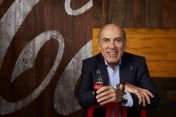CSD
One Year After Refranchising, What’s Next for Coke’s Largest U.S. Bottler? Katz Sees Complexity Management, Segmentation Among Keys to Growth
Read More
Future Smarts 2018 Highlights
Coca-Cola, Coke Swire, PepsiCo-Starbucks, Nestlé Waters, Anheuser-Busch
Read More
Lemon Lemon Shifts to International Markets.
PepsiCo’s Izze Fusions Mostly Gone in U.S. Amid Core Brands Refocus.
Read More
Carbonated Soft Drink Results at Retail: Nine Months 2018.
Pricing Up for Category and Top-3 Soda Companies.
Read More



